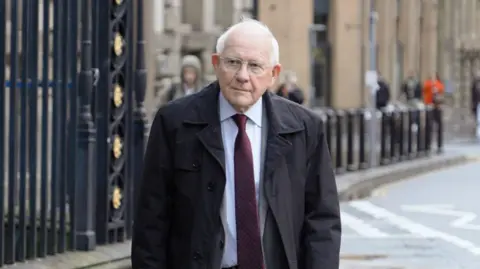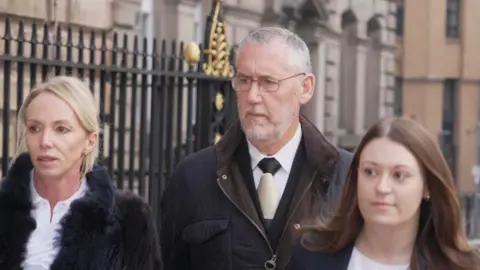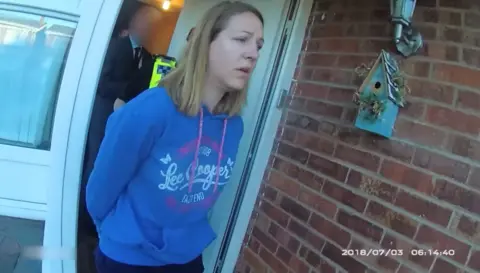Thirlwall Inquiry: Letby hospital chairman accepts ‘big personal failure’

 BBC
BBCThe former chairman of the hospital where serial killer Lucy Letby murdered babies has said his decision to not invite the doctors who suspected her to an important meeting was “a big personal failure”.
Sir Duncan Nichol chaired the board of directors at the Countess of Chester Hospital at the time Letby killed seven infants and tried to kill seven others between June 2015 and June 2016.
He also described an “emotional meeting” with one of those doctors after the police investigation began where he had apologised for not intervening sooner.
Sir Duncan has spoken publicly about the case for the first time at the public inquiry into the circumstances around Letby’s offending and the NHS response.
Letby had been removed from the neonatal unit in July 2016 and placed on clerical duties after senior consultants expressed concerns about her links to unexplained deaths and collapses of babies.
However, at an extraordinary board meeting, on 10 January 2017, the hospital’s medical director Ian Harvey recommended “assisting” her return to the unit.
Senior consultants had been invited to a previous extraordinary board meeting on 14 July 2016 in which one, Dr Ravi Jayaram, said their suspicions about Letby were the “elephant in the room”.
However, they were not invited to the second meeting.

Sir Duncan told the Thirlwall Inquiry, sitting at Liverpool Town Hall, that he accepted it was ultimately up to him to decide who attended that meeting.
“I regard it as personally a big failure on my part that the consultants were present at the first extraordinary board meeting and they were not present at this one, and they should have been,” he said.
He also offered an emotional apology to the families of Letby’s victims.
“I’ve never encountered a situation which has generated as much angst and stress as this one,” Sir Duncan said.
“I wanted to say that the Countess of Chester Hospital failed to keep babies safe in their care and that’s something that I found very, very stressful over time, and more importantly that caused unimaginable grief for the families whose babies died and I am so sorry that that happened in the way that it did.”
Sir Duncan, who was chief executive of the NHS Management Executive between 1989 and 1994, was also asked about another meeting on 30 June 2016 involving senior directors and some of the doctors.
Rachel Langdale KC, counsel to the inquiry, said records from the meeting showed consultant Dr Jim McCormick had said: “This is a Beverley Allitt /[Harold] Shipman situation.”
Allitt was a nurse who was jailed for murdering four babies in Lincolnshire in 1991, while Shipman was a GP who murdered up to 215 patients over a 30-year period.
Ms Langdale asked: “Did that make you sit up when you heard that?”
Sir Duncan said he could not recall the comment being made.
 Cheshire Constabulary
Cheshire ConstabularySir Duncan also said a comment made by Mr Harvey to the hospital’s Quality, Safety and Patient Experience Committee on 19 September 2016 was not accurate.
At that meeting, a report from the Royal College of Paediatrics and Child Health (RCPCH), which had been commissioned to review the neonatal unit, was discussed.
Mr Harvey told this meeting that the RCPCH “had not raised any immediate concerns” after being asked to conduct a review of the neonatal unit – when it had in fact called for Letby to be investigated.
The inquiry heard that no attempt to contact the police was made until May 2017, after the board had sought advice from criminal barrister Simon Medland QC.
Sir Duncan said: “Mr Medland reported back to us that he didn’t find any evidence of criminality but he used an expression that stayed in my memory, along the lines that ‘if events are still unexplained, the police should be called’.”
He added: “I wish we had had that advice in July 2016.”
‘Deeply sorry’
Ms Langdale asked Sir Duncan about an email he sent to Dr Jayaram on 25 May 2017.
The email said: “I want you and your consultant colleagues to know how deeply sorry I am for the personal distress that you have and are all suffering and for my part in not intervening sooner.”
On the same day, Sir Duncan went to find Dr Jayaram in person, the inquiry heard.
He told the inquiry that the two men had an emotional conversation, and added: “I remember us putting our arms around each other.”
Sir Duncan told the inquiry he now appreciated there was a “huge amount of sympathetic support” given to Letby by senior managers of which the board was “not sufficiently sighted of”.
The inquiry heard Letby’s parents, John and Susan Letby, sent a letter to Sir Duncan in July 2017 describing their daughter as being “singled out for punishment”.
The letter called for a meeting “as soon as possible” because “the anguish this situation is causing has become intolerable”.
Sir Duncan said he did not respond to the email, which came after the police investigation into Letby had begun.
The inquiry has previously heard evidence from the families of Letby’s victims that they were “kept in the dark” by the hospital.
Asked by Leanne Woods, representing some of the families, where they fitted in the “big picture”, Sir Duncan said: “The families were not in the big picture.
“We did not exercise appropriate duty of candour towards the families and that was a failure.
“A serious failure.”
The inquiry, now into its 12th week, is expected to sit into the new year.
Letby was convicted of murdering seven babies and eight counts of attempted murder, including two attempts on the same victim.
She is serving 15 whole-life prison sentences.





